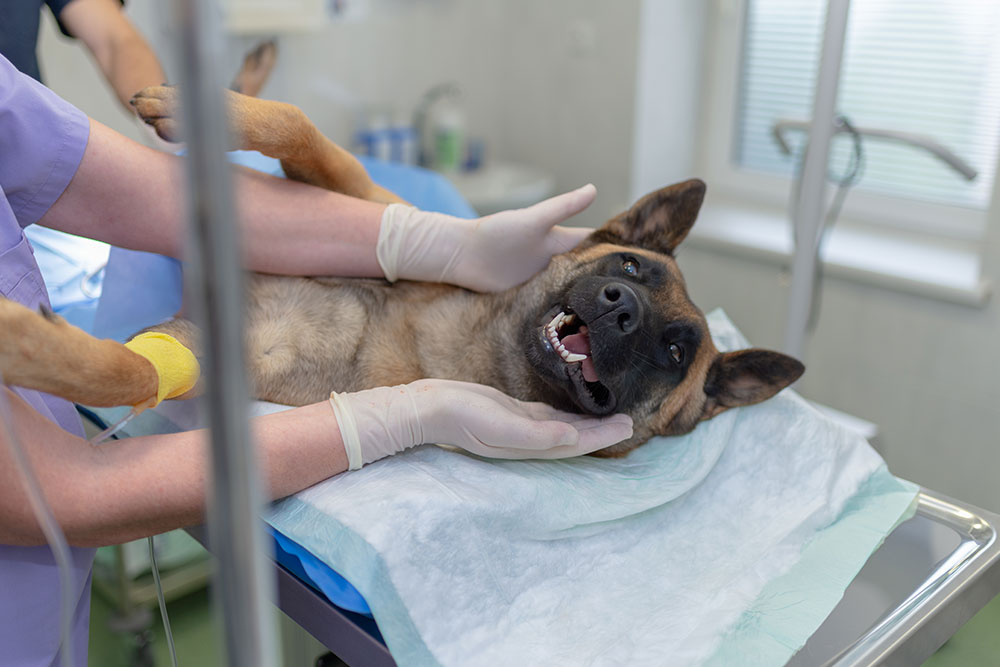The arrival of spring in Burlington brings sunshine, fresh air, and longer walks—but for some pets, it also marks the beginning of relentless itching, sneezing, and restlessness. If you’ve noticed your pet scratching more than usual or suddenly developing ear issues, seasonal allergies may be to blame.
At Burlington Veterinary Center, we know how upsetting it is to see your pet uncomfortable. That’s why we’re here to help you recognize the signs early, understand your options, and build a treatment plan that works—so your pet can get back to feeling like themselves.
Common Allergens: What’s Triggering the Reaction?
Unlike food or dust allergies that persist year-round, seasonal allergies tend to flare up during specific times of year. In Vermont, common environmental triggers include:
- Tree, grass, and weed pollen
- Mold spores, especially in damp, shaded areas
- Mildew or decaying leaves
- Flea saliva, which can cause allergic dermatitis
Allergies don’t just affect dogs—cats, rabbits, and other small animals can also suffer. Learn more about managing allergy symptoms in small mammals via Purdue Veterinary Hospital.
What Allergy Symptoms Look Like in Pets
Symptoms can show up in a variety of ways—some obvious, others more subtle. Key signs include:
Skin and Coat Changes
- Excessive licking, chewing, or scratching (especially paws, ears, belly, or armpits)
- Red, inflamed skin
- Hair thinning or bald patches
- Hives or raised bumps
Ear Issues
- Head shaking, odor, or discharge
- Recurring infections requiring frequent vet visits
Ear cleaning tips – Cornell University
Respiratory or GI Signs
- Sneezing, nasal discharge, watery eyes
- Rarely: vomiting or diarrhea from intense immune responses
Behavioral Changes
- Restlessness, anxiety, or disrupted sleep
- These are often caused by persistent discomfort.
Why Early Treatment Matters
It may start as a nuisance, but untreated allergies can progress to more serious problems:
- Secondary skin infections from constant scratching
- Thickened or darkened skin due to chronic inflammation
- Chronic ear conditions
- Heightened sensitivity to other allergens, including food
The earlier we intervene, the better chance we have of preventing long-term complications—and keeping your pet comfortable.
What to Expect During Diagnosis
When you bring your pet to Burlington Veterinary Center, we begin with a comprehensive exam and a review of your pet’s lifestyle, diet, and history. We may recommend:
- Skin cytology or scrapings to check for infections or mites
- Intradermal allergy testing (the gold standard)
- Serum allergy testing (less invasive, often used for cats or sensitive dogs)
- Food trials, if symptoms suggest year-round allergies
How We Treat Seasonal Allergies

Effective care typically combines short-term symptom relief with longer-term prevention. Options may include:
Medications
- Antihistamines for mild to moderate symptoms
- Corticosteroids for short-term inflammation control
- Apoquel® or Cytopoint® for targeted itch relief
- Antibiotics or antifungals to manage infections
Topical Therapies
- Medicated shampoos, mousses, or wipes for localized flare-ups
- Topical treatment insights – DVM360
Immunotherapy
- Allergy “shots” or oral drops tailored to your pet’s test results
- May reduce or eliminate the need for daily medications over time
Nutritional Support
- Omega-3 fatty acids to reduce inflammation
- Hypoallergenic diets when food sensitivities overlap
- Nutrition’s role in dermatitis – OVC Pet Nutrition
At-Home Allergy Management: What You Can Do Now
You play a key role in keeping your pet comfortable between visits. Here’s how:
- Bathe regularly with a vet-approved, soothing shampoo
- Wipe paws after outdoor time to remove pollen
- Wash bedding frequently in hot water
- Vacuum often and use HEPA filters to reduce indoor allergens
- Apply paw soaks or cool compresses during flare-ups
Why grooming matters – ASPCA
Don’t forget: year-round flea and tick prevention is essential, even in cooler months.
The importance of year-round prevention – AAHA
Before Your Appointment: What to Bring
To make the most of your visit:
- Track symptoms (dates, severity, and patterns)
- Bring a list of all current medications, supplements, and diet details
- Share photos or videos of flare-ups or concerning behavior
- Jot down your questions, such as:
- “Which treatment option is best for long-term relief?”
- “Could food be playing a role?”
- “How soon should I expect results?”
FAQs: What Pet Parents Want to Know
Q: Can pets grow out of allergies?
A: Not usually—seasonal allergies are chronic but manageable with the right plan.
Q: Are some breeds more likely to have allergies?
A: Yes. Bulldogs, Labs, Golden Retrievers, and Shih Tzus are among the most affected.
Q: Are natural remedies effective?
A: Omega-3s and probiotics can help—but always talk to your vet before adding supplements.
Q: Can allergies affect my pet’s mood or behavior?
A: Absolutely. Chronic discomfort can lead to anxiety, restlessness, or even aggression.
Let’s Help Your Pet Feel Better, Together
You don’t have to navigate allergy season alone. At Burlington Veterinary Center, our team is here to offer expert guidance and personalized support every step of the way. Whether your pet is showing symptoms for the first time or struggling with recurring flare-ups, we’re ready to help you find lasting relief.
Contact us with questions. Let’s get your pet back to feeling—and acting—like themselves again.







Leave A Comment